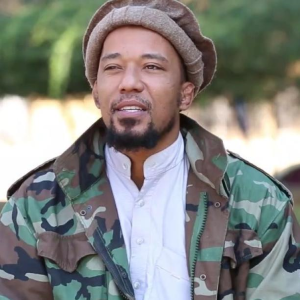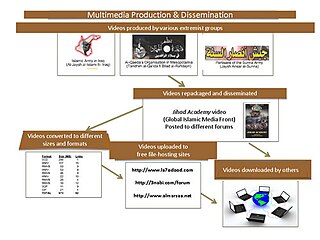Related Research Articles

Al-Qaeda is a pan-Islamist militant organization led by Sunni jihadists who self-identify as a vanguard spearheading a global Islamist revolution to unite the Muslim world under a supra-national Islamic caliphate. Its membership is mostly composed of Arabs but also includes people from other ethnic groups. Al-Qaeda has mounted attacks on civilian, economic and military targets of the U.S. and its allies; such as the 1998 US embassy bombings, the USS Cole bombing, and the September 11 attacks.
Management of Savagery: The Most Critical Stage Through Which the Islamic Nation Will Pass, also translated as Administration of Savagery, is a book by the Islamist strategist Abu Bakr Naji, published on the Internet in 2004. It aimed to provide a strategy for al-Qaeda and other extremists whereby they could create a new Islamic caliphate.

Jihadism is a neologism for modern armed Islamic movements that seek to base the state on Islamic principles. In a narrower sense, it refers to the belief that armed confrontation is a theologically legitimate method of socio-political change towards an Islamic system of governance.
Dirty Kuffar is an Islamic extremist 2004 Jihad Islamist extremist rap video produced by Muslim British rappers Sheikh Terra and the Soul Salah Crew.

Salafi jihadism, also known as Salafi-jihadism, jihadist Salafism and revolutionary Salafism, is a religiopolitical Sunni Islamist ideology that seeks to establish a global caliphate through armed militant means. In a narrower sense, jihadism refers to the belief that armed confrontation with political rivals is an efficient and theologically legitimate method of socio-political change. The Salafist interpretation of sacred Islamic texts is "in their most literal, traditional sense", which adherents claim will bring about the return to "true Islam".

Omar Shafik Hammami, also known by the pseudonym Abu Mansoor al-Amriki, was an American citizen who was a member and leader in the Somali Islamist militant group al-Shabaab. A federal warrant for his arrest was issued in 2007. In November 2012, the FBI added Hammami to its Most Wanted Terrorists list.
SITE Intelligence Group is an American for-profit consultancy group that tracks online activity of white supremacist and jihadist organizations. It is led by the Israeli analyst Rita Katz and based in Bethesda, Maryland. From 2002 to 2008, Katz headed an organization called the SITE Institute.
Inspire is an English-language online magazine published by the organization al-Qaeda in the Arabian Peninsula (AQAP). The magazine is one of the many ways AQAP uses the Internet to reach its audience. Numerous international and domestic extremists motivated by radical interpretations of Islam have been influenced by the magazine and, in some cases, used its bomb-making instructions in their attempts to carry out attacks. The magazine is an important brand-building tool, not just of AQAP, but of all al-Qaeda branches, franchises and affiliates.
Jihadi tourism, also referred to as jihad tourism or jihadist tourism, is a term sometimes used to describe travel to foreign destinations with the object of scouting for terrorist training. US diplomatic cables leaked in 2010 have raised concerns about this form of travel. Within intelligence circles, the term is also sometimes applied dismissively to travellers who are assumed to be seeking contact with extremist groups mainly out of curiosity.
Islamic extremism in the United States comprises all forms of Islamic extremism occurring within the United States. Islamic extremism is an adherence to fundamentalist interpretations of Islam, potentially including the promotion of violence to achieve political goals. In the aftermath of the September 11, 2001 terror attacks, Islamic extremism became a prioritized national security concern of the U.S. government and a focus of many subsidiary security and law enforcement entities. Initially, the focus of concern was on foreign Islamic terrorist organizations, particularly al-Qaeda, but in the course of the years since the September 11 terror attacks, the focus has shifted more towards Islamic extremist radicalized individuals and jihadist networks within the United States.

Denis Mamadou Gerhard Cuspert, also known by his stage name Deso Dogg and his nom de guerreAbu Talha al-Almani, was a German rapper who became a member of the Islamic State.
Terrorism, fear, and media are interconnected. Terrorists use the media to advertise their attacks and or messages, and the media uses terrorism events to further aid their ratings. Both promote unwarranted propaganda that instills mass amounts of public fear. The leader of Al Qaeda, Osama Bin Laden, discussed weaponization of media in a letter written after his organization committed the terrorist attacks of 9/11. In that letter, Bin Laden stated that fear was the deadliest weapon. He noted that Western civilization has become obsessed with mass media, quickly consuming what will bring them fear. He further stated that societies are bringing this problem on their own people by giving media coverage an inherent power.

The Global Islamic Media Front (GIMF) is an Islamist propaganda organization that is associated with the terrorist group, al-Qaeda, and other jihadist groups. The GIMF is known by the U.S. Federal Bureau of Investigation (FBI) as an "underground media" organization. The GIMF specializes in production of jihadist material for distribution. It is one of several organizations that jihadists use to spread information via the Internet, including the well-known As-Sahab. Their slogan that is used on their materials is "Observing Mujahideen News and Inspiring the Believers." There is no indication who the leader of this organization is.
Steven Stalinsky is an American scholar of the Middle East and Terrorism whose writings focus on the interplay between Islamic terrorism and technology, and especially terrorism and social media. He has served as executive director of the Middle East Media Research Institute (MEMRI) since 1999.
While many Islamist jihadists view hip-hop negatively due to its Western origins, there have also been examples of hip-hop songs with pro-jihadist lyrics, and of jihadists embracing hip-hop and gangsta culture as a way of attracting Westerners to join their organizations. The phenomenon is sometimes known as "Jihad Cool" and includes music, clothing, magazine, videos and other media.
The ideology of the Islamic State, unoffically referred to as Islamic Statism, has been described as being a blend of Salafism, Salafi jihadism, Sunni Islamist fundamentalism, Wahhabism, and Qutbism. Through its official statement of beliefs originally released by its first leader Abu Omar al-Baghdadi in 2007 and subsequently updated since June 2014, the Islamic State defined its creed as "a middle way between the extremist Kharijites and the lax Murji'ites".

Al-Qaeda in the Sinai Peninsula, or AQSP, was an Egyptian militant jihadist organization possibly formed by a merger between al-Qaeda operatives in Sinai and Ansar al Jihad. It was Al-Qaeda's branch in the Sinai peninsula, and is composed of many Al-Qaeda factions in the area. AQSP made international headlines in November 2014 when the organization pledged allegiance to the Islamic State (IS) in a nine-minute audio speech released on Twitter.
Online youth radicalization is the action in which a young individual or a group of people come to adopt increasingly extreme political, social, or religious ideals and aspirations that reject, or undermine the status quo or undermine contemporary ideas and expressions of a state, which they may or may not reside in. Online youth radicalization can be both violent or non-violent.
The Katiba des Narvalos is a non-partisan collective constituted from citizens from all venues of life, dedicated to fighting jihadism on social networks and more generally on the Internet. Their tactics comprise parody, as to discredit jihadist propaganda; surveying and reporting offending accounts; and infiltrating cyber-jihadist networks as to prevent terrorist attacks.
Al-Andalus Media, also known as Al-Andalus Media Production Foundation is the Jihadist propaganda unit for the militant organization Al-Qaeda in the Islamic Maghreb that creates video and audio messages that relate to the current conflict and issues with the people, specifically Muslims, in North Africa.
References
- 1 2 Laura Italiano (June 20, 2014). "American Muslims flocking to jihadist group". New York Post . Retrieved August 22, 2014.
- ↑ Steve Emerson (April 15, 2013). "Jihad is Cool: Jihadist Magazines Recruit Young Terrorists". Family Security Matters. Archived from the original on March 11, 2015. Retrieved August 22, 2014.
- ↑ J. Dana Stuster (April 29, 2013). "9 Disturbingly Good Jihadi Raps". Foreign Policy . Retrieved August 22, 2014.
- ↑ Picart, Caroline Joan S. (April 22, 2015). ""Jihad Cool/Jihad Chic": The Roles of the Internet and Imagined Relations in the Self-Radicalization of Colleen LaRose (Jihad Jane)". Societies. 5 (2): 354–383. doi: 10.3390/soc5020354 .
- ↑ Jytte Klausen (2012). "The YouTube Jihadists: A Social Network Analysis of Al-Muhajiroun's Propaganda Campaign". Perspectives on Terrorism. 6 (1). Archived from the original on August 26, 2014. Retrieved August 22, 2014.
- ↑ Cheryl K. Chumley (June 27, 2014). "Terrorists go 'Jihad Cool,' use rap to entice young Americans". Washington Times . Retrieved August 22, 2014.
- ↑ Dina Temple-Raston (March 6, 2010). "Jihadi Cool: Terrorist Recruiters' Latest Weapon". National Public Radio . Retrieved August 22, 2014.
- ↑ “Defeat al Qaeda by removing its "cool" image; The way to beat al Qaeda and stop Islamist groups gaining recruits to violent causes is to remove their "cool" image and make fun of terrorists instead, according to a major international study published on Friday,” Michael Holden, April 15, 2010, Reuters.